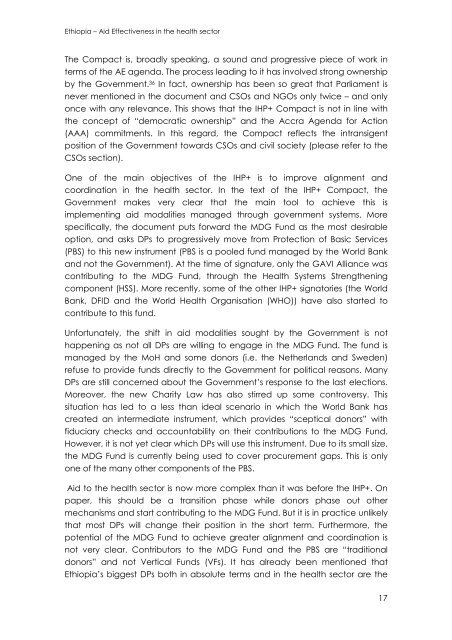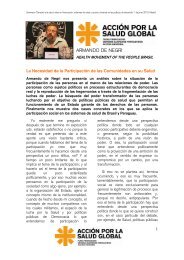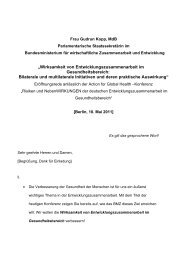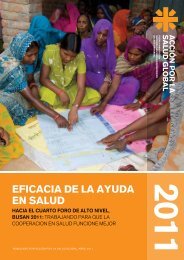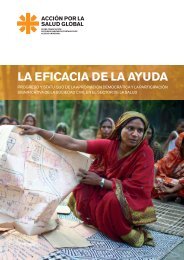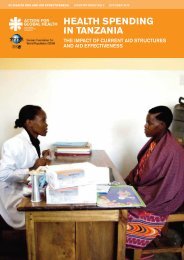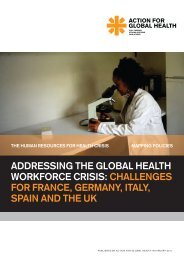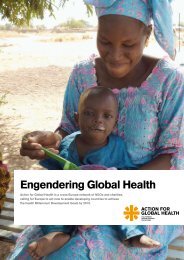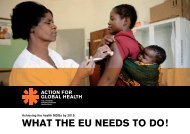Ethiopia Aid effectiveness in the health sector - Action for Global ...
Ethiopia Aid effectiveness in the health sector - Action for Global ...
Ethiopia Aid effectiveness in the health sector - Action for Global ...
You also want an ePaper? Increase the reach of your titles
YUMPU automatically turns print PDFs into web optimized ePapers that Google loves.
<strong>Ethiopia</strong> – <strong>Aid</strong> Effectiveness <strong>in</strong> <strong>the</strong> <strong>health</strong> <strong>sector</strong><br />
The Compact is, broadly speak<strong>in</strong>g, a sound and progressive piece of work <strong>in</strong><br />
terms of <strong>the</strong> AE agenda. The process lead<strong>in</strong>g to it has <strong>in</strong>volved strong ownership<br />
by <strong>the</strong> Government. 36 In fact, ownership has been so great that Parliament is<br />
never mentioned <strong>in</strong> <strong>the</strong> document and CSOs and NGOs only twice – and only<br />
once with any relevance. This shows that <strong>the</strong> IHP+ Compact is not <strong>in</strong> l<strong>in</strong>e with<br />
<strong>the</strong> concept of “democratic ownership” and <strong>the</strong> Accra Agenda <strong>for</strong> <strong>Action</strong><br />
(AAA) commitments. In this regard, <strong>the</strong> Compact reflects <strong>the</strong> <strong>in</strong>transigent<br />
position of <strong>the</strong> Government towards CSOs and civil society (please refer to <strong>the</strong><br />
CSOs section).<br />
One of <strong>the</strong> ma<strong>in</strong> objectives of <strong>the</strong> IHP+ is to improve alignment and<br />
coord<strong>in</strong>ation <strong>in</strong> <strong>the</strong> <strong>health</strong> <strong>sector</strong>. In <strong>the</strong> text of <strong>the</strong> IHP+ Compact, <strong>the</strong><br />
Government makes very clear that <strong>the</strong> ma<strong>in</strong> tool to achieve this is<br />
implement<strong>in</strong>g aid modalities managed through government systems. More<br />
specifically, <strong>the</strong> document puts <strong>for</strong>ward <strong>the</strong> MDG Fund as <strong>the</strong> most desirable<br />
option, and asks DPs to progressively move from Protection of Basic Services<br />
(PBS) to this new <strong>in</strong>strument (PBS is a pooled fund managed by <strong>the</strong> World Bank<br />
and not <strong>the</strong> Government). At <strong>the</strong> time of signature, only <strong>the</strong> GAVI Alliance was<br />
contribut<strong>in</strong>g to <strong>the</strong> MDG Fund, through <strong>the</strong> Health Systems Streng<strong>the</strong>n<strong>in</strong>g<br />
component (HSS). More recently, some of <strong>the</strong> o<strong>the</strong>r IHP+ signatories (<strong>the</strong> World<br />
Bank, DFID and <strong>the</strong> World Health Organisation (WHO)) have also started to<br />
contribute to this fund.<br />
Un<strong>for</strong>tunately, <strong>the</strong> shift <strong>in</strong> aid modalities sought by <strong>the</strong> Government is not<br />
happen<strong>in</strong>g as not all DPs are will<strong>in</strong>g to engage <strong>in</strong> <strong>the</strong> MDG Fund. The fund is<br />
managed by <strong>the</strong> MoH and some donors (i.e. <strong>the</strong> Ne<strong>the</strong>rlands and Sweden)<br />
refuse to provide funds directly to <strong>the</strong> Government <strong>for</strong> political reasons. Many<br />
DPs are still concerned about <strong>the</strong> Government’s response to <strong>the</strong> last elections.<br />
Moreover, <strong>the</strong> new Charity Law has also stirred up some controversy. This<br />
situation has led to a less than ideal scenario <strong>in</strong> which <strong>the</strong> World Bank has<br />
created an <strong>in</strong>termediate <strong>in</strong>strument, which provides “sceptical donors” with<br />
fiduciary checks and accountability on <strong>the</strong>ir contributions to <strong>the</strong> MDG Fund.<br />
However, it is not yet clear which DPs will use this <strong>in</strong>strument. Due to its small size,<br />
<strong>the</strong> MDG Fund is currently be<strong>in</strong>g used to cover procurement gaps. This is only<br />
one of <strong>the</strong> many o<strong>the</strong>r components of <strong>the</strong> PBS.<br />
<strong>Aid</strong> to <strong>the</strong> <strong>health</strong> <strong>sector</strong> is now more complex than it was be<strong>for</strong>e <strong>the</strong> IHP+. On<br />
paper, this should be a transition phase while donors phase out o<strong>the</strong>r<br />
mechanisms and start contribut<strong>in</strong>g to <strong>the</strong> MDG Fund. But it is <strong>in</strong> practice unlikely<br />
that most DPs will change <strong>the</strong>ir position <strong>in</strong> <strong>the</strong> short term. Fur<strong>the</strong>rmore, <strong>the</strong><br />
potential of <strong>the</strong> MDG Fund to achieve greater alignment and coord<strong>in</strong>ation is<br />
not very clear. Contributors to <strong>the</strong> MDG Fund and <strong>the</strong> PBS are “traditional<br />
donors” and not Vertical Funds (VFs). It has already been mentioned that<br />
<strong>Ethiopia</strong>’s biggest DPs both <strong>in</strong> absolute terms and <strong>in</strong> <strong>the</strong> <strong>health</strong> <strong>sector</strong> are <strong>the</strong><br />
17


